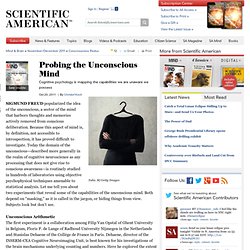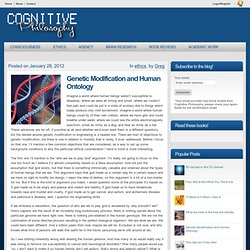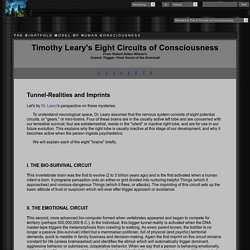

Dimming the IQ of America. Americans and Europeans are getting dumber.

At least that’s the conclusion David Solway reaches in his piece “The Decline of Intelligence in the West.” In the last century various studies have shown the average IQ in Western countries dropping by about 14 percent, Solway reports. He points readers to these investigations and offers a score of examples illustrating this decline, ranging from video interviews of college students who know next to nothing about the history of our country to leaders who say “corpsemen” instead of “corpsmen” when referring to combat medics. Solway then looks for reasons behind this decline. Probing the Unconscious Mind. SIGMUND FREUD popularized the idea of the unconscious, a sector of the mind that harbors thoughts and memories actively removed from conscious deliberation.

Because this aspect of mind is, by definition, not accessible to introspection, it has proved difficult to investigate. Today the domain of the unconscious—described more generally in the realm of cognitive neuroscience as any processing that does not give rise to conscious awareness—is routinely studied in hundreds of laboratories using objective psychophysical techniques amenable to statistical analysis. Let me tell you about two experiments that reveal some of the capabilities of the unconscious mind. Both depend on “masking,” as it is called in the jargon, or hiding things from view. Our perceptions of masculinity and femininity swayed by our sense of touch. Gender stereotypes suggest that men are usually tough and women are usually tender.

A new study published in Psychological Science, a journal of the Association for Psychological Science, finds these stereotypes have some real bodily truth for our brains; when people look at a gender-neutral face, they are more likely to judge it as male if they're touching something hard and as female if they're touching something soft. Several studies have found recently that we understand many concepts through our bodies. For example, weight conveys importance; just giving someone a heavy clipboard to hold will make them judge something as more important than someone who holds a light clipboard. Embodied cognition is not what you think it is. The most exciting thing in cognitive science right now is the theory that cognition is embodied.

It is, in fact one of the things interested lay people know about cognitive science, thanks in part to a lot of high profile experiments that claim to show how cognition can be influenced and biased by states of the body, or that cognitive states can affect states of the body in ways that suggest abstract metaphors and concepts are grounded in the behaviour of the body. A recent blog post at Scientific American covers this ground quite nicely (although the large picture of Noam "not an embodied cognitive scientist" Chomsky hints that someone didn't actually read the piece). The problem, however, is that this is not really what embodied cognition is about. Embodiment is not the weak claim that you can see small effects of the behaviour of the body in our mental representations of the world. "Moving Through Time" and embodied cognition.
In which I am a bit rude about a rubbish paper and worry about how to kill papers like it.

The term 'embodied cognition' has been checked out of the library by a lot of different people, all of whom use it to mean something different. My least favourite definition comes from the cognitive literature, which considers embodiment to be about how internal, abstract cognitive function can be 'revealed' motorically (the Barselou (2008) version of embodiment).
This definition is rooted firmly in the assumption of mental representation. 2013 Heart Coherence Increases Order of Crystallization Patterns in Dried Saliva Study. Genetic Modification and Human Ontology. Imagine a world where human beings weren’t susceptible to diseases, where we were all strong and smart, where we couldn’t feel pain and could be put in a state of ecstasy due to things which today produce only mild excitement.

Imagine a world where human beings could fly of their own volition, where we have gills and could breathe under water, where we could see the entire electromagnetic spectrum, smell as richly as a dog, and hear as richly as a bat. These advances are far off, if possible at all (and whether we’d even want them is a different question), but the debate around genetic modification or engineering is a heated one. There are host of objections to genetic modification, but there is one in relation to morality that is rarely, if ever, addressed. Before I focus on that one, I’ll mention a few common objections that are considered, as a way to set up some background conditions to why the particular ethical consideration I have in mind is more interesting.
The Eight Circuits of Consciousness. The four evolving future 'brains' are:V.

THE NEUROSOMATIC CIRCUIT When this fifth "body-brain" is activated, flat Euclidean figure-ground configurations explode multi-dimensionally. Gestalts shift, in McLuhan's terms, from linear VISUAL SPACE to all-encompassing SENSORY SPACE. A hedonic turn-on occurs, a rapturous amusement, a detachment from the previously compulsive mechanism of the first four circuits. I turned this circuit on with pot and Tantra. List of cognitive biases. Systematic patterns of deviation from norm or rationality in judgment Cognitive biases are systematic patterns of deviation from norm and/or rationality in judgment.
They are often studied in psychology, sociology and behavioral economics.[1] Although the reality of most of these biases is confirmed by reproducible research,[2][3] there are often controversies about how to classify these biases or how to explain them.[4] Several theoretical causes are known for some cognitive biases, which provides a classification of biases by their common generative mechanism (such as noisy information-processing[5]).
Gerd Gigerenzer has criticized the framing of cognitive biases as errors in judgment, and favors interpreting them as arising from rational deviations from logical thought.[6] Top 10 Common Faults In Human Thought. The human mind is a wonderful thing.

Cognition, the act or process of thinking, enables us to process vast amounts of information quickly. For example, every time your eyes are open, you brain is constantly being bombarded with stimuli. 10 More Common Faults in Human Thought. This list is a follow up to Top 10 Common Faults in Human Thought.

Thanks for everyone’s comments and feedback; you have inspired this second list! It is amazing that with all these biases, people are able to actually have a rational thought every now and then. There is no end to the mistakes we make when we process information, so here are 10 more common errors to be aware of. La voie du kaizen : un petit pas à la fois.
Ontology & Free Will. Human Nature. Life as Allegory. Opinari. Questionable. Emotivo. Ethno Botanica. Likelihoods. Rather Likely. Seems Likely. Most Likely Too. Cognition.